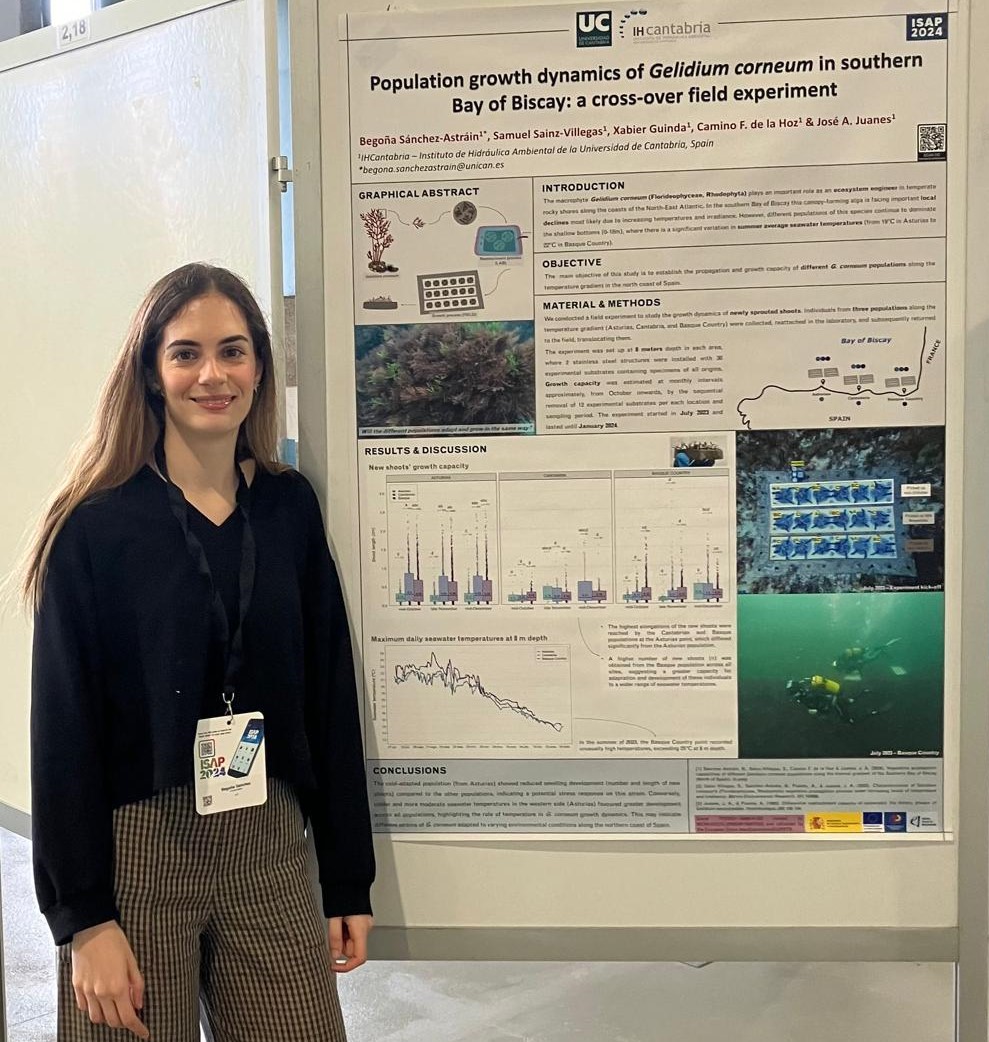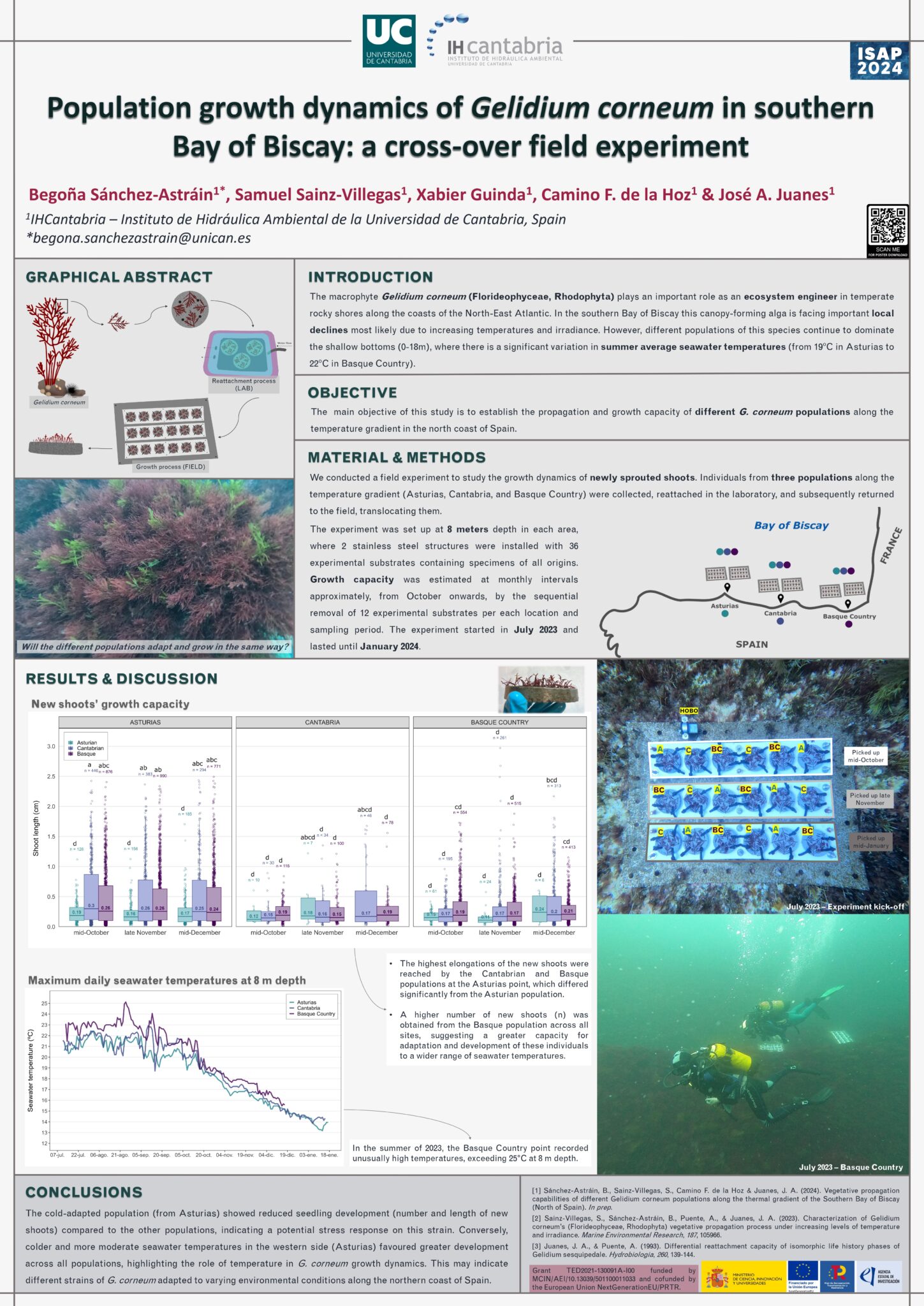Predoctoral researcher from IHCantabria was awarded for a poster she presented at the international congress ISAP2024, in Portugal

Begoña Sánchez Astráin poses next to the poster she presented and which was awarded at the ISAP2024 international congress
Her poster explained the characteristics of a study that analyzes the propagation and growth capacity of populations of the red alga Gelidium corneum, one of the main sources of raw material for the elaboration of agar-agar
Begoña Sánchez Astráin, predoctoral researcher at the Environmental Hydraulics Institute of the Universidad de Cantabria (IHCantabria), has received an award for having made one of the best poster presentations at the “8th Conference of the International Society of Applied Phycology” (ISAP2024), held in Porto, Portugal, between June 16 and 21.
The ISAP2024 conference focused especially on “Algae 2030: Challenges and Opportunities” and provided an excellent forum to discuss and forge new interdisciplinary partnerships or consortia in order to successfully attract European and global funding agencies. This event also provided an invaluable opportunity for the group of students who attended, as it promoted the exchange of ideas and inspired them to create new networks that will be fundamental to their future. Therefore, it was an excellent opportunity to network and to learn about the work being developed in other countries.
Recent work in the field of microalgae and macroalgae biotechnology was presented at this international congress, as well as climate impact studies carried out on algal communities in other countries.
Begoña Sánchez Astráin’s poster, which won an award at the ISAP2024 international congress, summarized the results obtained in one of the experiments she developed as part of her doctoral thesis. The objective of this study was to establish the propagation and growth capacity of different populations of the red alga Gelidium corneum along the temperature gradient along the northern coast of Spain.
Red algae or rhodophytes are an important group of algae comprising approximately 7000 species of a great diversity of shapes and sizes. Gelidium corneum is a rhodophyte that plays a crucial role in rocky subtidal bottoms, as it acts as a habitat-creating species and is one of the main sources of raw material for agar-agar production.
However, the biomass of this type of algae is decreasing in rocky subtidal bottoms, perhaps due to the increase in seawater temperature and solar radiation in recent decades. Despite this, there are different populations of this algae that still dominate the shallow bottoms (0-18 m), where average summer temperatures vary considerably (from 19ºC in Asturias to 22ºC in the Basque Country).
To better understand the adaptive capacity of different populations of red algae, Begoña Sánchez Astráin conducted a field experiment, together with other members of the Coastal Ecosystems group of IHCantabria, in which they placed refixed fragments of Gelidium corneum in Asturias, Cantabria and the Basque Country. This type of algae or rhodophyte was placed at a depth of 8 meters and its origins were translocated (moved to other sites) to observe the growth of new individuals of the different populations and assess their adaptive capacity.
The development of this study has allowed us to obtain interesting results, “since we have observed that the population of Gelidium corneum from the Basque Country, adapted to warmer summers, shows a greater capacity to adapt and develop in a wider range of temperatures, compared to the other two populations studied,” says Begoña Sánchez Astráin.
The scientific program of ISAP2024 was complemented by a diverse social and cultural program, which included excursions to outstanding places in Portugal, highlighting numerous uses of micro and macroalgae.

Image of the poster by Begoña Sánchez Astráin, awarded at the “8th Conference of the International Society of Applied Phycology”(ISAP2024), held in Porto, Portugal, June 16-21, 2024.



